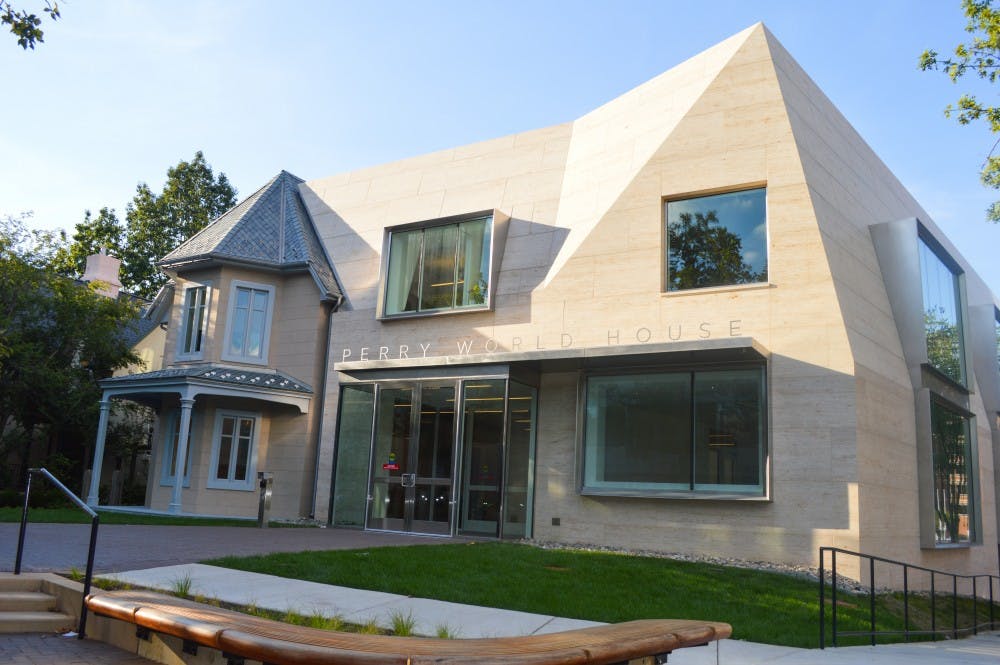President Tsakhiagiin Elbegdorj of Mongolia gave a public lecture at Penn on Friday as part of a day-long visit to Philadelphia. The event was organized by the American Center for Mongolian Studies, whose United States operations are housed at Penn’s Center for East Asian Studies, in conjunction with the Perry World House.
Besides honoring Elbegdorj’s Philadelphia visit, the event showcased Penn programs that have advanced Mongolian studies in the U.S. ACMS recently organized a program for eight Penn students to study and compare urban planning and development in Beijing and Ulaanbaatar. In 2011, a team of students and faculty from Penn’s biology department traveled to Mongolia to study the effects of climate change on the country’s grasslands.
Popularly called Mongolia’s “Golden Sparrow of Democracy,” Elbegdorj spoke about his experiences leading popular democratic protests that brought an end to Soviet-style communist dictatorship in Mongolia in 1990.
“Mongols say that it’s better to live by your own choice — no matter how bitter — than by others’ rules — no matter how sweet they are,” Elbegdorj said.
The youngest of eight sons in a nomadic herding family, Elbegdorj studied journalism at a Soviet military academy in Ukraine, where he had observed the introduction of free speech and open elections under the Soviet policy of glasnost (“openness”). After graduating in 1988, Elbegdorj returned home and began joining youth groups who advocated similar reforms in Mongolia.
On December 10, 1989, Elbegdorj moderated an unauthorized pro-democracy street gathering in the capital. That demonstration spawned more pro-democracy rallies, protests and several hunger strikes throughout the country.
Back then, speaking out against the communist regime was dangerous — Elbegdorj recalled receiving jail threats and his employer had already threatened to fire him if he continued to express anticommunist opinions, he said.
RELATED:
Perry World House opens with former UN High Commissioner, former Secretary of Defense
Leaders come together in 'well-lit situation room' of Perry World House
But the movement continued, and four months later, the communist government finally gave in. Elbegdorj believes that Mongolia’s transition to democracy was successful — and permanent — because it had overwhelming support from the people.
“If you feel the challenges together with your people, the answers will come from that,” Elbegdorj said.
He has since served two terms as Mongolia’s prime minister and earned graduate degrees from the University of Colorado Boulder and Harvard University’s John F. Kennedy School of Government. Since winning the presidency in 2009, Elbegdorj has pursued reforms in anticorruption, environmental protection, women’s rights, the rule of law and economic liberalization.
He continues to look towards other countries to build political, social and cultural ties. Elbegdorj originally came to Philadelphia at the invitation of the Philadelphia Orchestra, which is scheduled to perform in Ulaanbaatar as part of its 2017 tour of Asia. He said he had always been eager to see the “birthplace of liberty and independence,” as he described Philadelphia.
Although Mongolia still faces political and economic challenges, Elbegdorj believes that its democracy remains intact because it allows disgruntled citizens to voice their grievances — even if they are directed at him. National legislation, introduced by Elbegdorj, explicitly prevents media outlets from coming under government control.
For him, actively improving and protecting Mongolia’s young democracy will always be a priority. Getting rid of the old system of dictatorship, he says, was the easy part. To truly protect democracy, every generation must be continually taught to appreciate an open political mindset.
“Freedom is like a child, it has to be nurtured every day,” Elbegdorj said.
That was probably idea behind a 2013 speech he gave in North Korea, where he told a group of students at Kim Il-Sung University, named after the founder of North Korea’s authoritarian regime, that “no tyranny lasts forever.”









